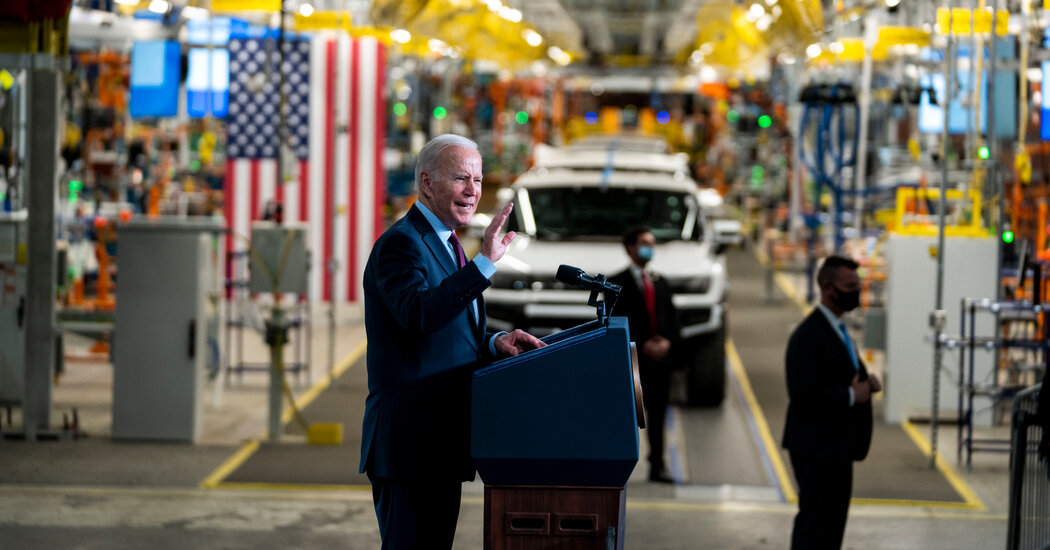
Over the past few years, many Democrats argued that there was a simple secret to electoral success: enact popular legislation.
President Biden tried to make that theory a reality. He enacted a big stimulus plan, a bipartisan infrastructure bill and he’s made progress toward pushing through an ambitious $2 trillion spending bill that has finally passed the House.
But so far, popular policies haven’t made for a popular president. His approval ratings have slipped into the mid-40s, even though virtually all of his legislation commands majority support in the same surveys. In poll after poll, voters seem to give Mr. Biden no credit for his agenda. They say he hasn’t accomplished much. They even say he hasn’t helped them personally, even though he sent direct stimulus payments to most households and even more to parents.
If anything, voters say he’s made things worse.
The disconnect between Mr. Biden’s popular policies and his personal unpopularity is a little hard to understand. After all, voters do care about the issues. They’ve proved it by gradually sorting into ideologically divided parties over the past two decades. And it’s clear that presidents can be punished for advancing an unpopular agenda. Just ask Barack Obama about the period after the Affordable Care Act was passed.
But if voters often punish a president for pushing unpopular policies, they rarely seem to reward a president for enacting legislation. Instead, voters seem to reward presidents for presiding over peace and prosperity — in a word, normalcy.
Today, Mr. Biden is not seen as presiding over the long promised return to normalcy. Maybe that will change in the months ahead. But Mr. Biden’s policy agenda is not expected to do much to help his approval rating so long as Americans do not believe that agenda responds to the most immediate issues facing the country.
It’s hard to think of recent examples of voters overcoming their skepticism of a president because of a popular policy program. If anything, it’s the relatively unproductive Democratic presidents — like John F. Kennedy, Jimmy Carter and Bill Clinton in his second term — who managed to avoid midterm drubbings over the past 80 years. Not even Medicare and Medicaid seemed to help the Democrats in 1966 and 1968. They were crushed.
The only exception to this pattern has been the New Deal, which helped Franklin D. Roosevelt cement a Democratic majority. Unlike the Great Society or Obamacare, the New Deal was relentlessly focused on addressing the immediate economic crisis that concerned most Americans. Its famous “three Rs” were relief for the unemployed, recovery of the economy and reform to prevent another Depression. It fits the pattern of a public more responsive to the economy than anything else.
The predominance of the economy in American public opinion is one of those basic and seemingly obvious findings of political science that is still somewhat hard to fully internalize. That’s partly because it’s at odds with how most individual voters — and especially politically engaged voters — think about politics. Most people back their party through the worst economic times; even the fastest economic growth wouldn’t persuade them to back the president of the other party.
Yet the behavior of the electorate as a whole is quite different from the behavior of most of the voters who make it up.
One fact that helps make sense of the pattern: Less engaged voters don’t think about policy in nearly as much depth as the typical political activist. The typical voter may not follow politics or public policy closely at all.
A voter like this might say they “support” or “oppose” a policy initiative when asked by a pollster, but they may have only a loose sense of the details of public policy. For some, a policy proposal might be little more than an abstraction — an abstraction that sounds good but remains fundamentally intangible and without deep meaning.
In a way, trying to get ordinary voters to back a party or a candidate based on a specific policy initiative is somewhat like trying to get someone to buy something they didn’t really ask for.
What do voters ask for? Well, a strong economy and jobs. It’s boring. It’s not ideological. It’s not what progressives might say in response to this question — things like reducing income inequality or addressing climate change. But the state of the economy is almost always the No. 1 issue in the polls. It usually takes the back seat only in the case of a highly unusual circumstance or a crisis, like a war or a pandemic.
So far, Mr. Biden hasn’t quite given voters what they’ve asked for. Yes, economic growth has been robust and unemployment has fallen. Under most circumstances, these numbers would probably translate to the perception of a strong economy. Maybe they will in time. But these aren’t quite normal circumstances. The strong numbers belie a steady stream of reports of various economic challenges, from persistent worker shortages and supply chain issues to inflation and rising gas prices. No one is under the impression that the economy is working quite as it should.
In a recent CNN poll, 58 percent of Americans said Joe Biden wasn’t paying enough attention to the nation’s most important problems, including 72 percent of those who say the economy is the most important issue.
Not surprisingly, the enactment of the bipartisan infrastructure bill has also done little to help Mr. Biden. His approval rating stood at 43 percent on the day the bill passed, according to FiveThirtyEight. It’s still at 43 percent today.
A recent poll by Echelon Insights, a Republican firm, found that 72 percent of registered voters wanted Mr. Biden’s top priority to be getting inflation under control and fixing supply chain issues, compared with 21 percent who thought the priority should be new spending on social services, health care and green energy.
Recently, Mr. Biden’s presidency has been compared to Mr. Roosevelt and his New Deal. But Mr. Biden’s candidacy was compared to an entirely different president: Warren Harding, whose “Return to Normalcy” campaign in 1920 came on the heels of the 1918 influenza pandemic, labor unrest, World War I and the Red Scare.
In terms of policy, the New Deal and the “Return to Normalcy” had nothing in common. One was a vast expansion of government. The other involved a tax cut. While the policies were very different, both sought to get America out of a crisis and benefited from sustained economic growth.
Politically, Mr. Roosevelt and Mr. Harding had something else in common: They both won in landslides.







